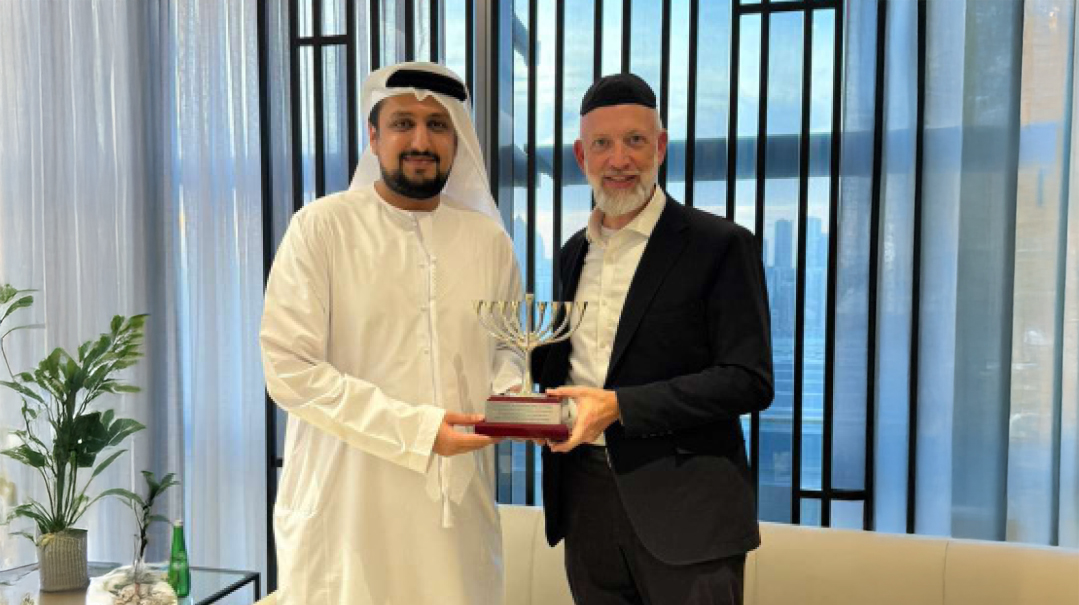The Value of Family Time
| October 13, 2024When our view of a relationship is that it will remain forever, we figure out a way to get it right

There are many things that make the Yom Tov season so special. And a big part of it is the quality time that families spend together with each other. This is a truly invaluable experience, one that should be cherished.
In fact, I once heard a story about a man who came to Rav Dovid Feinstein with a question. He explained that his wife was a recovering alcoholic. Her addiction was so serious that she was not even supposed to be in the same room as wine. Because of this, the family used grape juice for Kiddush every Shabbos and Yom Tov instead of wine. However, that particular year the man’s father wanted to bring the entire extended family to Eretz Yisrael to celebrate Pesach together.
This fellow had a real dilemma. If he and his family went along, then all of the families together with them on the trip would have to drink grape juice instead of wine for the four cups at the Seder. This is not halachically ideal, especially given that Rav Moshe Feinstein felt that wine at the Seder was an actual requirement. The man asked Rav Dovid what he should do.
Rav Dovid Feinstein responded that the value of having the whole family together was so high that it was worth making every single member of the extended family drink grape juice at the Seder instead of wine, just so that everyone in the family — including this man’s wife — would gain from that Yom Tov family experience.
This conveys a beautiful message about the importance of family time and the value it brings into our lives. But as many families can testify, things are not always so rosy or picturesque when relatives get together for Yom Tov. Many people, even if they enjoy a beautiful Yom Tov, can come out of the experience with negative feelings. After spending so much time with family members, it is inevitable that some people might leave feeling hurt, offended, or perhaps underappreciated by something insensitive someone said or did. Friction and discord are extremely commonplace when so many family members gather for an extended period of Yom Tov celebration.
The question is, how can we prevent these negative feelings from coming up during the Yom Tov experience? And how can we cure ourselves once they do?
The Bane of Insecurity
The main trigger for many of the ill feelings that arise when families spend the Yom Tov together was beautifully articulated in a piece written by Rabbi Joey Haber (Acharei Mos–Kedoshim newsletter) about a lesson from Chazal in Maseches Avos.
The Mishnah in Pirkei Avos (1:12) says, “Be among the students of Aharon — one who loves peace, pursues peace, loves people, and draws them close to Torah.” The question here is that Chazal generally refer to Aharon as “Aharon HaKohein,” conferring his proper title on him, his badge of honor. Moshe is called “Moshe Rabbeinu,” Yosef is called “Yosef Hatzaddik,” and Aharon is called “Aharon HaKohein.” Why here does the Mishnah omit the honorific and just use the name “Aharon”?
Rabbi Haber offered a fabulous explanation for this. Aharon’s signature trait was that he was always resolving conflicts between people who were fighting. He was the ultimate peacemaker. But how was he so successful at bringing shalom?
The Mishnah here teaches us his trick. A complicated relationship between family members can be caused by any of a multitude of factors. It can be the result of some siblings being more frum or less frum than others. Maybe it’s about the difference in financial stability or material comfort, and all the stress parnassah comparisons bring. Maybe it’s the chemistry (or lack thereof) between kids being raised in different social upbringings.
Any of these things certainly can incite family strife, but most often it’s something else entirely — it’s insecurity. When one sibling shows up for the Yom Tov experience and tries to impress his family with his credentials and successes in life, others get insecure. Whether it’s about whom he or she married, how well the kids are doing in school, how beautiful his or her home is, or how smart or learned he or she may be, when one sibling’s successful and productive life is put on display and everyone else in the family has to hear about it, sometimes at great length, it makes them feel intimidated.
And that feeling of insecurity sparks a negative reaction or comment, ignites resentment, and things can spiral out of control. No matter the age or stage of life, when one “flexes” about achieving success in some arena of life, it puts the others on edge, and the friction has begun.
So how do we find the antidote for this poison that can seriously hamper our Yom Tov family experience? Explained Rabbi Haber — we must learn from Aharon. The Mishnah, when extolling his ability as a peacemaker among families, calls him just “Aharon,” omitting his title “HaKohein.” Why?
Because the way he solved family disputes was by just being “Aharon.” No credentials. When uniting people with their family, he strived to be just “one of the boys.” No titles, no trying to impress anyone. He realized that if he carried the title of “Aharon HaKohein” when dealing with people’s inner politics, they would not feel comfortable. He felt he needed to come across as ordinary and simple in order to achieve peace, so people didn’t feel insecure and get defensive.
The lesson we learn from this is that if we want to truly enjoy Yom Tov with family members, we must come to the table without talking too much about our spiritual accomplishments, without bragging about our kids, without gloating about our businesses. We need to take into account the possible insecurities of those around us and be sensitive to their situations. We need to be just “Aharon.”
Going Separate Ways
On the other side of the coin, another vital lesson about the family Yom Tov experience can be derived from a story about Avraham Avinu.
The Torah says that “vayehi riv” (Bereishis 13:7), an argument broke out between the camp of Avraham Avinu and his nephew Lot. In the next pasuk (13:8), Avraham suggests that the two parties and close relatives separate, “al na sehi merivah beini u’veinecha,” so that a fight doesn’t erupt between us.”
The Alshich Hakadosh explains that first we are taught that a riv began, which connotes a relatively minor argument. Once there was a riv and tensions began to rise, Avraham decided that it was most prudent to separate the families, so that a merivah, which connotes a full-blown fight, should not develop.
Herein lies a critical lesson for us. Before making our Yom Tov plans — before the married children start the bidding wars for the best rooms in the house, before the mass Chol Hamoed trips are planned that exclude some age groups or bore the others, before Yom Tov is set in stone as a time when everyone’s dream expectations must be met — we ought to remember the lesson of Avraham Avinu.
As much as quality family time is of supreme value and unparalleled beauty, if gathering siblings together is likely to lead to a merivah, an explosive battle that can wreak even more damage than a minor riv that already has tensions simmering, then the solution of Avraham Avinu of hafreid na mei’alai, “let’s give each other some space,” might be the way to go.
If the different family members can make it work when they come together for Yom Tov, that’s awesome. Kol hakavod. But if that togetherness tends to lead to a merivah, we can take Avraham Avinu’s wisdom of keeping a healthy distance between sparring family members, and not having everyone under the same roof for all of Yom Tov.
Because sometimes this coveted and all-important family peace will only be maintained long-term if we don’t sit together at the same table for extended periods of time. Whatever facilitates lasting family harmony must be embraced, even if sometimes that means separation.
He’s Still Your Brother
But what if you did get together with the entire family for Yom Tov, and someone did say something offensive or hurtful, and you are justifiably upset? How, after the fact, can I live with siblings or other family members when they sorely disappointed me and let me down?
The Torah in parshas Vayigash tells us the dramatic story of Yosef revealing his identity to his brothers. He breaks the news to them that he is Yosef, and says, “Ani Yosef achichem asher machartem osi Mitzraymah — I’m your brother, Yosef, whom you sold to Mitzrayim.”
Why was it necessary for Yosef to mention to his brothers at that critical moment the fact that they had sold him to Mitzrayim? They surely didn’t forget that detail, and it had nothing to do with his identity.
Rav Yitzchok Hutner offered a powerful insight about family relationships to explain this pasuk. Yosef was telling his brothers, “You may have severely harmed me, you may have even sold me as a slave, but I am still your brother Yosef. No matter what you’ve done to me, no matter how badly you’ve sinned against me, nothing will change the fact that you’re still my brother. And so I will let it go, and not hold on to the resentment, because you are family.”
Sometimes a sibling, a parent, a child, a cousin, can offend me or hurt me in the most severe way. But they are still, at the end of the day, my sibling, parent, child, or cousin, and that familial relationship stays forever. Peace within family is of paramount importance, because family is forever. And when our view of a relationship is that it will remain forever, we figure out a way to get it right, overlook the differences, and live with the family peace and harmony we all so desperately dream of.
Have a wonderful and most peaceful Yom Tov!
Rabbi Aryeh Kerzner is the rav of Agudas Yisrael of Montreal and a noted posek and popular speaker. Many of his shiurim and speeches are available online. He is the author of the sefer Halachah at Home, published by ArtScroll/Mesorah.
(Originally featured in Mishpacha, Issue 1033)
Oops! We could not locate your form.







